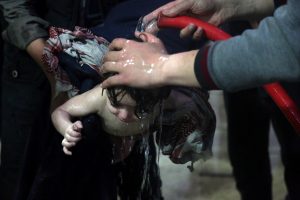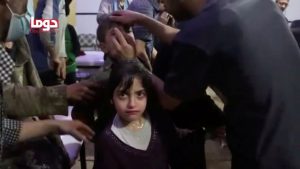
By David Milliken and Alistair Smout
LONDON (Reuters) – British Prime Minister Theresa May won backing from her senior ministers to take unspecified action with the United States and France to deter further use of chemical weapons by Syria after a suspected poison gas attack on civilians.
The prospect of a confrontation between Russia, the Syrian government’s ally, and the West has loomed since Trump said on Wednesday that missiles “will be coming” in response to the attack in the Syrian town of Douma on April 7.
Trump has since tempered those remarks and the White House said no final decisions on possible actions had been taken.
Russia has warned the West against attacking its Syrian ally President Bashar al-Assad, who is also supported by Iran, and says there is no evidence of a chemical attack in Douma, a town near Damascus which had been rebel-held until this month.
May has said “all indications” point to Syrian responsibility for the attack. She told her senior ministers on Thursday the Douma events showed a “deeply concerning” erosion of international legal norms barring the use of chemical weapons.

A child is treated in a hospital in Douma, eastern Ghouta in Syria, after what a Syria medical relief group claims was a suspected chemical attack April, 7, 2018. Pcture taken April 7, 2018. White Helmets/Handout via REUTERS
“Cabinet agreed on the need to take action to alleviate humanitarian distress and to deter the further use of chemical weapons by the Assad regime,” a spokeswoman for the prime minister said in a statement after the meeting.
Ministers agreed that May should continue to work with the United States and France to come up with the right response. The statement made no specific reference to military action.
Later, May’s office said she had spoken with Trump by telephone, and the two had agreed it was vital to challenge Assad’s use of chemical weapons, and that they would continue to work closely together to do so.
Opposition Labour Party leader Jeremy Corbyn, a veteran anti-war campaigner, said Britain should press for a U.N.-led investigation rather than follow the lead of the United States.
May has said that Russia’s veto at the Security Council of a vote to create a new inquiry on chemical attacks meant the U.N. could have no role in investigations.
“The government appears to be waiting for instructions from President Donald Trump on how to proceed,” Corbyn said in a statement.
“Britain should press for an independent U.N.-led investigation of last weekend’s horrific chemical weapons attack so that those responsible can be held to account.”
Corbyn has said any action in Syria should be put to a parliamentary vote. A YouGov poll showed just one in five members of the public support a strike on Syria.
The BBC said May was ready to give the go-ahead for Britain to take part in action led by the U.S. without seeking prior approval from parliament, and the Financial Times said the cabinet had agreed to this. The Downing Street statement did not mention parliament, and a spokeswoman did not comment on those reports.
May is not obliged to win parliament’s approval, but a non-binding constitutional convention to do so has been established since a 2003 vote on joining the U.S.-led invasion of Iraq.
Britain has launched air strikes against Islamic State militants in Syria, but not against the country’s government.
Parliament voted down British military action against Assad’s government in 2013, in an embarrassment for May’s predecessor, David Cameron. That then deterred the U.S. administration of Barack Obama from similar action.
(This story corrects wording of paragraph two)
(Reporting by David Milliken, Kate Holton and Guy Faulconbridge; writing by Alistair Smout; editing by Andrew Roche)









